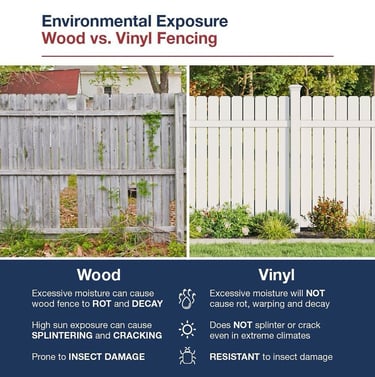Wood vs. Vinyl Fencing: Making the Right Choice
When it comes to fencing, homeowners are often faced with the decision of choosing between wood and vinyl materials. Both options have their unique advantages and challenges. Understanding how each material performs under different environmental conditions is crucial for making an informed choice that suits your property’s needs and budget.
ARTICLES
1/17/20252 min read


Wood Fencing
Wood fences have been a classic choice for decades, offering a natural and traditional appearance. However, they require ongoing maintenance to keep them in good condition.
Pros:
• Aesthetic Appeal: Wood fences have a timeless, rustic look that can complement various landscaping styles.
• Customizable: Easily stained or painted to match your property’s color scheme.
Cons:
1. Rot and Decay: Exposure to excessive moisture can lead to rotting, which weakens the structure over time.
2. Sun Damage: High sun exposure can cause splintering and cracking, reducing the fence’s longevity.
3. Insect Damage: Wood is prone to termites and other pests that can severely damage the material.
Vinyl Fencing
Vinyl fencing has gained popularity as a durable and low-maintenance alternative to wood. Its modern, sleek appearance is perfect for a clean and polished look.
Pros:
1. Resistant to Moisture: Vinyl will not rot, warp, or decay, even in high-humidity or rainy conditions.
2. Durable Under the Sun: Vinyl does not splinter or crack, making it ideal for areas with extreme weather.
3. Insect Resistance: Unlike wood, vinyl is impervious to insect damage, ensuring long-term reliability.
4. Minimal Maintenance: Vinyl fences are easy to clean with soap and water, requiring no staining or painting.
Cons:
• Higher Initial Cost: Vinyl fences typically have a higher upfront cost compared to wood.
• Limited Customization: While vinyl is available in various styles, it lacks the natural aesthetic and flexibility of wood customization.
Environmental Performance
• Moisture Exposure: Vinyl excels in wet conditions as it does not absorb water or deteriorate like wood.
• Sun Exposure: Vinyl remains intact in intense sunlight, while wood can splinter or crack.
• Insect Damage: Vinyl is completely resistant, while wood requires regular treatments to prevent pests.
Which Fence Is Right for You?
1. Budget: If you’re looking for a lower initial investment and don’t mind occasional maintenance, wood might be your choice. However, if you’re thinking long-term, vinyl’s durability and low upkeep may save you money over time.
2. Climate: Vinyl is better suited for humid, rainy, or extremely sunny climates, while wood might work well in milder environments.
3. Aesthetic Preference: For a more natural and customizable appearance, wood is unbeatable. For modern, clean, and hassle-free fencing, vinyl takes the lead.
Conclusion: Both wood and vinyl fences have their place, depending on your priorities. While wood offers a natural, timeless look, vinyl provides unmatched durability and ease of maintenance. Choose the material that best fits your lifestyle and local environmental conditions.
For expert fencing installation and advice, contact ProHands Handyman Services today!
📞 818-401-7766
We’ll help you build the fence of your dreams, tailored to your needs!
